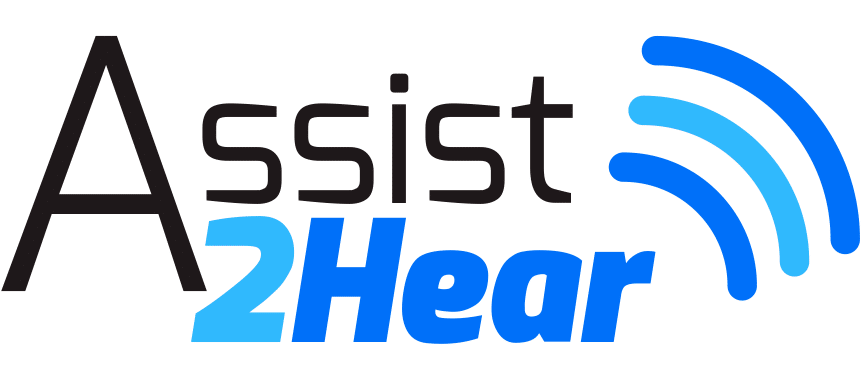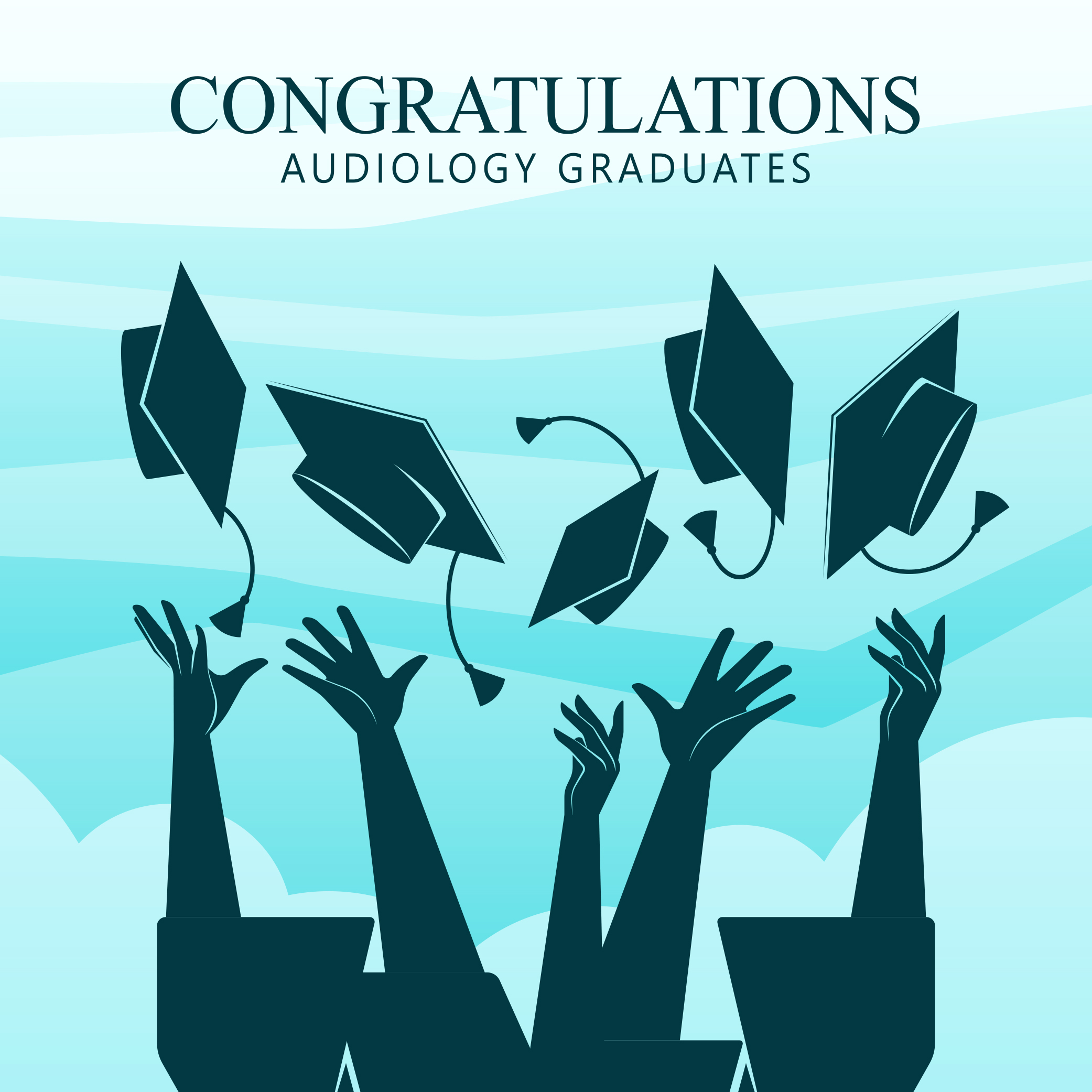


Graduation Blues
When my mother was taken to the emergency room on Wednesday afternoon, her only concern was to be home by Friday. She was determined to attend her granddaughter’s graduation. Fortunately, she was able to go home on Thursday and made it to the graduation with a day to spare. Unfortunately, she couldn’t hear a thing.
My father and mother both live with hearing loss. My niece was among the first to receive her diploma because she graduated with honors. As soon as the ceremony began, I was instantly disappointed. I was disappointed because I realized that if I couldn’t understand the words because of the echo, reverberation, and distance, then I knew my parents couldn’t understand a word.
My father and mother both live with severe hearing loss, as mine is only mild; yet feels pretty severe and affects my daily life. My parents both have wonderful hearing aids which generally help in small settings, but they still struggle in large spaces like churches, theaters, and stadiums. We were even seated on the front row of the physically disabled section which was on the football field instead of in the stands. I knew the venue did not have a hearing loop, but instead they had a type of hearing assistive technology which required headsets. Headsets are usually not an option for many people with hearing aids or Cochlear implants.
My parents couldn’t understand the blessing or the multiple valedictorian speeches. My dad is sadly used to mumbled graduation ceremonies, but my mom struggled and strained to listen. My niece was the 7th child to graduate. As soon as she crossed the stage, my mother said, “Did she already go? Did they call her name?” My heart sunk because she had worked extra hard to put on a brave face so that she could leave the hospital to make it to her granddaughter’s gradual did not get to hear the most special part of a graduation for a family member. It wasn’t fair that my parents then had to listen to the mumble of 347 other children’s names and the farewell from the commencement speaker. They did not have the feeling of pride that everyone else got to feel.
School administrators need to understand that the graduate’s brief moment in the sun means a lot to family members. Grandparents, parents, and friends of the graduates who live and suffer with hearing loss deserve an easy fix called a hearing loop.
A hearing loop also known as an audio induction loop system, creates a magnetic field which cooperates with hearing aids to eliminate distance from the microphone, as well as background noise and echo. In other words, the hearing aid or hearing device becomes a personal loudspeaker. My mother said that a hearing loop “feels like a private conversation between me and the speaker.”
The ADA requires public spaces to offer hearing assistance in spaces where hearing is integral to the use of that space. What does this mean? It means that if you have a large area and you expect people to hear what you want to say through a sound system, then you must have one of three ADA compliant systems for hearing accessibility. Hearing loops are
We wouldn’t think twice about wheelchair access because we understand it and we can see it. Hearing loss is an invisible disability which affects more people then heart disease or diabetes. Hearing Loops Help.

A Night at the Movies… with Hearing Loss
But now I’m in my early 40s with hearing loss, and lately I am reading my movies instead of watching them while wearing uncomfortable communal headphones. Take me back in time with you, Michael J. Fox!
If I didn’t laugh, I’d cry!
Take a stroll with me as I paint a light-hearted story about my night at the movies… while suffering with my hearing loss.
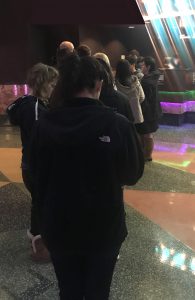 I do not wear hearing aids yet, but my hearing test revealed they are in my not-so-distant future. I am constantly turning my head to hear better and reading lips for to confirm what I think I heard. Restaurants, car rides, and church services have become increasingly difficult hearing situations. When I learned about hearing assistive technology required in most public spaces including movie theaters, I swallowed my embarrassment and started asking for the hearing assistance. In my community, like countless others throughout the country, hearing assistance is hard to find.
I do not wear hearing aids yet, but my hearing test revealed they are in my not-so-distant future. I am constantly turning my head to hear better and reading lips for to confirm what I think I heard. Restaurants, car rides, and church services have become increasingly difficult hearing situations. When I learned about hearing assistive technology required in most public spaces including movie theaters, I swallowed my embarrassment and started asking for the hearing assistance. In my community, like countless others throughout the country, hearing assistance is hard to find.
It all started when a dear friend and I decided to watch a remake of one of my favorite movies – Jumanji (highly recommend).
Act 1, Scene 1:
“Famous last words: There’s plenty of time before the movie starts.”
We arrived about 15 minutes early before our 7:30pm movie and headed straight to the guest service desk to inquire about their assistive hearing technology. Unfortunately, the line was extra long because it was also an understaffed ticket booth. Upon arriving at the front of the line at 7:28, the teenage assistant who couldn’t leave his post had to call his manager who was somewhere in the 20+ theater complex; I quietly imagined her in a projection room with film reels and popcorn flying through the air in chaos.
I urged my friend to find seats for us because I could tell more waiting was in the store. She arrived at the guest services desk at 7:32. After waiting several more minutes, she sweetly brought me a 2 foot tall (not kidding) close caption device and an FM receiver hanging from a lanyard with a simple foam headset.
She assured me the receiver batteries would last the entire movie, the receiver was programmed correctly, and the headset was clean. But… the foam earpiece covers were dusty. Very dusty.
Normally I don’t mind dust, but just then, I realized the dust on the foam headset cover was most likely due to dusty ears. I’m sure my eyes glazed over as my mind started wondering to the wide variety of the flaky, dusty ears that used the foam headsets before me.
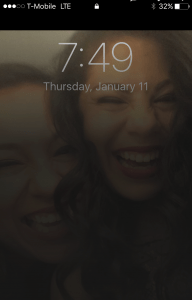 I asked the assistant how their headsets are cleaned and how often. She assured me that they are cleaned after each use with alcohol cleaning swabs. I said “Wonderful! May I have one of those swabs just so that I can clean these guys once more myself?” She gave me a nervous look and quickly went to the back room but couldn’t locate them. She took off for her hunt in the main lobby, but didn’t return again until 7:47. She explained that she could not locate the alcohol swabs anywhere. Instead, she brought me a folded-up piece of paper towel, damp with cleaning spray she had found at the confession stand. She assured me it was a “safe cleaning spray,” but I used my 40-year-old judgment and decided against it. I removed as much dust as I could from the foam headsets by hand and tried to ignore the rest.
I asked the assistant how their headsets are cleaned and how often. She assured me that they are cleaned after each use with alcohol cleaning swabs. I said “Wonderful! May I have one of those swabs just so that I can clean these guys once more myself?” She gave me a nervous look and quickly went to the back room but couldn’t locate them. She took off for her hunt in the main lobby, but didn’t return again until 7:47. She explained that she could not locate the alcohol swabs anywhere. Instead, she brought me a folded-up piece of paper towel, damp with cleaning spray she had found at the confession stand. She assured me it was a “safe cleaning spray,” but I used my 40-year-old judgment and decided against it. I removed as much dust as I could from the foam headsets by hand and tried to ignore the rest.
I finally walked into the movie theater at 7:49 for my 7:30 movie even though I arrived early at 7:21! 7:49!!!!
Act 2, Scene 1
“Closed Captioning for the non-embarrassed.”
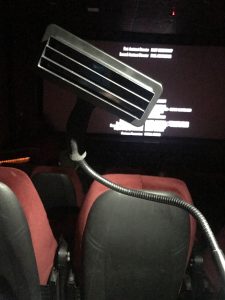 Let’s set the scene: The lights are off, the movie’s started, and the smell of popcorn that I didn’t have time to get is already haunting me. My friend scored killer seats- top row center. He patiently helped me hold my caption device, my headsets, and my lanyard with the FM receiver, all as I try to slither out of my winter coat and not bother the gentleman next to me. I finally get comfortable and start playing with the close captioning device.
Let’s set the scene: The lights are off, the movie’s started, and the smell of popcorn that I didn’t have time to get is already haunting me. My friend scored killer seats- top row center. He patiently helped me hold my caption device, my headsets, and my lanyard with the FM receiver, all as I try to slither out of my winter coat and not bother the gentleman next to me. I finally get comfortable and start playing with the close captioning device.
This contraption is intended to sit snugly in my cup holder with ease and flex up to be adjusted to the users preferred line of vision. Unfortunately, it’s a bit cumbersome and takes up my valuable cup holder real estate. As embarrassing as it was to flex the squeaky arm where I needed it to be, I was quite worried that I was ruining the experience for the guy next to me, but he was a gentleman and never complained.
Act 2, Scene 2
“To wear headphones or not to wear headphones. That is the question!”
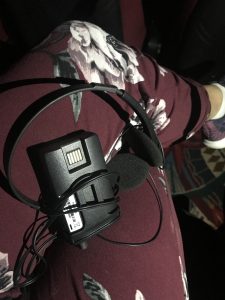 With the close captioning screen just under my nose, I was ready to fight the FM receiver battle. I was pleasantly surprised when I turned on the receiver and it was playing the correct movie!
With the close captioning screen just under my nose, I was ready to fight the FM receiver battle. I was pleasantly surprised when I turned on the receiver and it was playing the correct movie!
Believe it or not, it is very common for FM receivers to be programmed to the wrong movie. Whenever I realize a receiver has been programmed wrong, I debate with myself for 10 minutes about whether to get another headset, then track down a manager for another five minutes and finally get back to my movie five minutes after that. So, it is very common that mis-programmed receivers wind up sitting in my lap.
I ignored my dirty-headset paranoia and put on my headset with ‘kinda clean’ foam covers. Finally, I settled in to watch the movie which had already been playing for more than 20 minutes.
Act 2, Scene 3
“What we have here is a failure to communicate.”
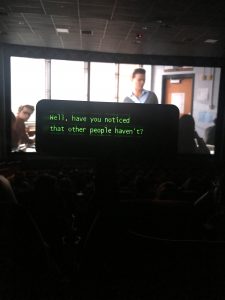 I was a little confused when I started listening to the movie because one ear was programmed for the hard-of-hearing, while the other ear, which was programmed for the blind/vision-impaired, gave me a scene-by-scene narration every few seconds.
I was a little confused when I started listening to the movie because one ear was programmed for the hard-of-hearing, while the other ear, which was programmed for the blind/vision-impaired, gave me a scene-by-scene narration every few seconds.
He gazed in the distance with a smoldering look.
He runs frantically as the rhinos give chase.
The creepy bird flies away towards the spooky mountain.
I let my friend listen and it was funny at first, but then it wasn’t. It became so annoying that I tilted my headset in my hair so that only my right ear would have sound and I didn’t have to hear the narration. When I could only use one ear to hear the movie, I was still struggling. It made me very hesitant to waste my time bothering to check out equipment that doesn’t work at all for me and very committed find a theater that actually wants me to enjoy myself.
At 8:07, 37 minutes after the movie had started, and 8 minutes after I finally got comfortable, I gave up the struggle and decided to take off the headset altogether, along with lanyard and receiver from my neck, and try to hear the movie without assistance.
The Final Act:
“Hearing loops make entertainment accessible to all.”
When my hearing aid days finally arrive (most likely before I turn fabulous and 50), I would like to think my community and venues will offer access to me in public buildings by installing a hearing technology system which actually works! Headsets and neck loops are troublesome, unreliable, and embarrassing while hearing loops let me keep my dignity through discretion.
I’m not exactly sure who came up with the FM or Infrared headset system, but I’m very sure that it wasn’t designed for me or anyone with hearing aids or Cochlear implants.
FM systems and IR systems meet ADA standards, but both systems require the use of headsets and continual maintenance and training. I don’t mind people staring at my hearing loss, but my mother and daughter would both rather sit in silence than stick out with headphones announcing their hearing loss to the world. Even if I could convince my sweet mother to wear the headset, she uses perfectly tuned hearing aids and must take them out of her ears (and drop them into her bottomless purse with a million pockets) if she wants to use the FM or IR headsets. Unfortunately, even with the best headsets, without her hearing aids she can’t hear a thing! For her, a hearing loop system is the best option for movie theaters and most large rooms.
The disability of hearing loss is clearly being overlooked by the entertainment industry. And it is quite disheartening to see that no expense has been spared from luxury movie theater complexes except the hearing assistance! Everything from carpeted hallways, to art-deco style lighting fixtures, and even four types of gorgeous tiles in the bathrooms, but complexes won’t even loop ONE theater? There are sometimes 20 theaters in a complex and each boasts of cutting edge sound systems, yet I have to wear dirty foam headsets that rarely work correctly?
Consider these demographics from the Hearing Loss Association of America:
- About 20 percent of Americans, 48 million, report some degree of hearing loss.
(This statistic includes myself, my parents, two grandparents, my daughter, my two friends, and my local hearing loss association group and most of us enjoy going to movies!)
- At age 65, one out of three people has a hearing loss.
(That’s a huge number of active seniors who are struggling to find hearing friendly entertainment.)
- Almost 15% of school-age children (ages 6-19) have some degree of hearing loss.
(How many of your movie patrons are school-aged children??)
Yes, the ADA compliance box can be checked off with an FM or IR system, but does it really offer access to your guests who really need it? To me, offering headsets is like having a wheelchair ramp on the side of the building covered with gravel and bushes! The purpose of hearing loops in movie theaters is to invite everyone to enjoy the big screen. Hearing Loops helps your guests living with hearing loss, TO HEAR THE MOVIE and therefore come back- often!
There was a time when movie theaters were the heart of every city center. With the revitalization of suburbs and urban districts, movie theaters and performing art venues are once again breathing life back into our communities. By including hearing loops in every venue where sound is integral to the use of the space (in my opinion, every single movie theater and auditorium in the country) the entertainment industry can bring back that “Movie Magic” to thousands suffering with hearing loss. Besides, silent movies went out of style decades ago!
So, to sum up my night at the movies with hearing loss, I learned:
- Hearing Loops are the perfect solution for movie theaters because they do not require headsets which rarely work well- with or without hearing aids!
- Closed captioning is absolutely worth all the fuss because at least I get to READ the movie, but it won’t help me to HEAR the movie.
- A good friend will offer to help while you struggle with hearing loss at a movie and will laugh with you through the shenanigans!
For more information about adding a hearing loop to theaters or performance arts theaters, please contact Assist2Hear at (877) 338-1084.
Better Hearing Health in 2018!

One of the most common reactions people have when they develop hearing loss is D-E-N-I-A-L! But denying hearing loss has an impact on others as well as your own well-being.
Make a Resolution for Better Hearing in 2018!
The new year is here and Assist2Hear encourages you to make a resolution for better hearing health. Many of us know that hearing loss affects senior citizens, but it also affects every other age group including teenagers at an alarming level.
Typical signs of hearing loss
One of the most common reactions people have when they develop hearing loss is D-E-N-I-A-L! But denying hearing loss has an impact on others as well as your own well-being. If you recognize these typical signs of hearing loss in yourself or your loved ones, a simple hearing screening might be your answer to hearing better.
- Buzzing/Ringing in ears
- Muffled Hearing
- Failure to respond
- Squinting to Understand
- Head tilting/turning to hear better
- Listening to music/tv at high volume
- Difficulty following conversations/ Lip Reading
- Depression/Withdrawal
If your audiologist suggests hearing aids are in your future- Do not delay! Many people struggle with hearing loss an average of 5-7 years before finally buying hearing aids. Would you spend years with blurry vision instead of buying glasses? The dangers of postponing hearing aids are numerous.
So, consider a few reasons not to delay getting hearing aids:
Reason #1: Did you know that the longer you wait to get hearing aids, the harder it is for your brain to adjust to hearing certain sounds again? Much like glasses and bifocals, the brain must adjust to sound via hearing aids that may not have been heard in some time, such as birds chirping, appliances running, and everyday sounds that may have been unheard in recent years. This can be very frustrating to many new hearing aid wearers and takes time to adjust.
Reason #2: Hearing is a very important sense that contributes to our well-being. Not being able to hear results in many people isolating themselves from family and social interaction, which in turn affects their mental and physical health, as well as safety. Hearing loss can lead to depression, anxiety, confusion and withdrawal in all age groups including teenagers.
Reason #3: While hearing aids are not perfect and do not “cure” hearing loss any more than glasses cure vision loss, they do improve hearing in many settings and open the door to add assistive listening devices to help the hearing aids hear better in other situations like induction hearing loops. A manual t-coil setting in the hearing aid allows the wearer to enjoy sound in hearing loops.
So, what are you waiting for? A hearing assessment is typically free at most audiology offices. Hearing aids can be basic or state of the art, depending on your budget and level of hearing loss. It takes some persistence on your part to make the hearing aids comfortable to wear and get them adjusted correctly. So be patient and work with your audiologist to get it right! You will be glad you did and so will your family and friends!
Are you in DENIAL about Hearing Loss?

Denial about Hearing Loss is very common!
Are you struggling to hear clearly? Do you find yourself asking people to repeat themselves because you believe they are mumbling? Is it difficult to hear in a restaurant or riding in a car? Are you struggling to hear the sermon at church or a speaker during a presentation? Many of us are missing out on important parts of a conversation, constantly trying to fill in the blanks. Are you in denial about hearing loss?
Many of us are in a state of denial about our hearing loss and it is very common. Most hearing loss is very gradual so it can go unnoticed for a long time. We miss the clues and deny the facts. We can’t see or feel hearing loss. Yet, hearing is one of our most important senses. It keeps us connected socially – or not. It is important to our employment, yet we are afraid to say anything for fear of retribution or loss of a job. It is important to our safety and well-being to hear sirens, horns or impending danger.
When did eye glasses become ok but not hearing aids? We’ll spend several thousand dollars to have our eyes fixed with a laser, but we are reluctant to spend the same to improve our hearing. The bad part about denial of your hearing loss is that your brain actually forgets the sounds you used to hear and now do not. The longer this goes on, the harder it is for the brain to relearn these sounds when you are finally fit with a hearing aid. Relate this to your brain adjusting to new bi-focals or tri-focals in your glasses or contacts. It can be unnerving and actually painful when sounds are brought back into your life until the brain adjusts. Some people quit using their hearing aids for this reason! Sure, hearing aids are not perfect and do not “cure” hearing loss any more than glasses cure vision loss, but they are a step toward maintaining quality of life.
With the Baby Boomers making up about 1/3 of the hard of hearing population in the US, hearing loss is becoming more common in conversation. Access for the hard of hearing in many private and public venues is becoming an issue. New revised ADA standards effective 3/15/12 clearly mandate that all public venues of any size with a sound system must provide assistive listening devices. Hearing loops are the favored system by many and loops are becoming more common in the US. Grass roots initiatives are gaining ground in many states including Colorado, Oklahoma, Kansas, Texas, Michigan, Wisconsin, New York, Florida, New Mexico and Arizona.
Advocacy for hearing access is on the rise after being shoved under the carpet for many years. We at Assist2Hear are trying to do our part in promoting access for the hard of hearing and educating the public and hearing professionals about what is available to help the hard of hearing, most notably induction hearing loops.
Are you ready to acknowledge your hearing loss and do something about it? Please visit your local audiologist for a hearing screening and make sure to bring a friend or family member to check theirs as well!
